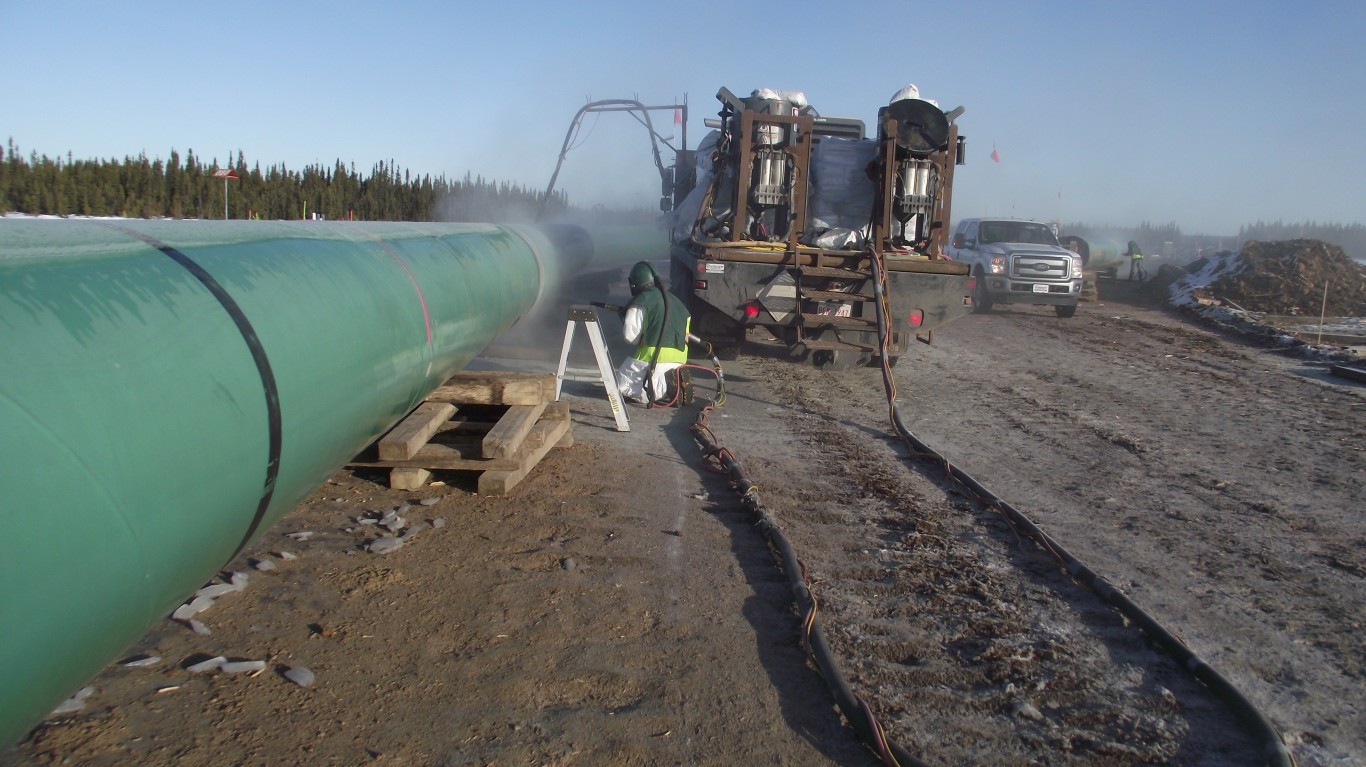
Canada’s Prime Minister, Justin Trudeau, and his Liberal government have approved the proposed expansion of the controversial Trans Mountain Pipeline that carries crude oil from the oil sands of western Alberta to the British Columbia coastal city of Burnaby. In May of 2018, the Canadian government paid nearly $3.5 billion to acquire the pipeline system from Kinder Morgan Canada, a subsidiary of energy infrastructure giant Kinder Morgan Inc. (NYSE: KMI).
Opposition from many of Canada’s native First Nations in unmoved by the government’s action, however. If anything, resistance to expanding the pipeline system has hardened.
In a press release Tuesday, Tiny House Warriors spokesperson Kanahus Manuel said: “The Trudeau government does not have the right to put a pipeline through unceded Secwepemc land. To try to legitimize this illegal act, Canada uses what legal scholars call its ‘cunning misinterpretation of “consent” which is inconsistent with Indigenous, constitutional and international law.’ … This is merely trying to put a brown face on the rape of our land. We will not allow that to happen.”
For his part, Trudeau has long maintained that economic growth and environmental stewardship are not mutually incompatible. At a press conference Tuesday in Ottawa, Trudeau tried to drive home his point: “We are a government that cares deeply about the environment, and we care just as deeply about the economic success of Canadians. … It is in Canada’s national interest to protect our environment and invest in tomorrow while making sure people can feed their families today.”
Trudeau also said that pipeline construction would begin again this summer and pledged to use profits from government ownership of the pipeline to fund the country’s transition to clean energy.
Not all of Canada’s First Nations oppose the pipeline expansion. A group of 134 First Nations met in January to discuss a plan to buy the pipeline. The price could be pretty steep. Bloomberg cites the country’s Parliamentary Budget Office estimate for total construction costs of C$9.3 billion (about $7 billion).
Kinder Morgan acquired the Trans Mountain system in 2005 when it acquired Canadian pipeline company Terasen for $5.6 billion. In 2007, Kinder Morgan expanded the Trans Mountain’s capacity to 300,000 barrels a day and announced the expansion to 890,000 barrels a day at the same time. The company set the cost of the expansion at $7.4 billion.
Moving oil out of Alberta and on to international markets is critical to Canada’s economy and that is why Prime Minister Trudeau pushes so hard for the construction of the Trans Mountain pipeline. Delays at two other major pipeline projects continue to plague oil sands producers and the country’s government.
The proposed Enbridge Inc. (NYSE: ENB) expansion of its Line 3 pipeline system from the Alberta oil sands to an outlet on Canada’s east coast has been hampered by delays, the latest of which came Tuesday when two Minnesota state agencies refused to release draft permits for the project pending resolution of issues with the pipeline’s environmental review.
A third expansion project–the Keystone XL pipeline– to move 830,000 barrels of oil a day from Alberta to the U.S. Gulf Coast has been delayed for so long that TransCanada Corporation, the pipeline’s owner, has changed its name to TC Energy Corporation (NYSE: TRP). A three-judge panel of the Ninth U.S. Circuit Court of Appeals last week lifted an injunction blocking construction. TC Energy, however, has said that it missed this year’s construction season and that it will not invest more in the pipeline until it has a clear path to completion. A second lawsuit against the pipeline and the permit for its construction issued by the Trump administration in 2017 remains to be decided.
The longer pipeline transportation out of Alberta is delayed the less the oil is likely to be worth if the spread of electric vehicles happens as rapidly as recent projections predict.
The Average American Is Losing Momentum on Their Savings Every Day (Sponsor)
If you’re like many Americans and keep your money ‘safe’ in a checking or savings account, think again. The average yield on a savings account is a paltry .4%* today. Checking accounts are even worse.
But there is good news. To win qualified customers, some accounts are paying nearly 10x the national average! That’s an incredible way to keep your money safe and earn more at the same time. Our top pick for high yield savings accounts includes other benefits as well. You can earn up to 3.80% with a Checking & Savings Account today Sign up and get up to $300 with direct deposit. No account fees. FDIC Insured.
Click here to see how much more you could be earning on your savings today. It takes just a few minutes to open an account to make your money work for you.
Thank you for reading! Have some feedback for us?
Contact the 24/7 Wall St. editorial team.
 24/7 Wall St.
24/7 Wall St.



